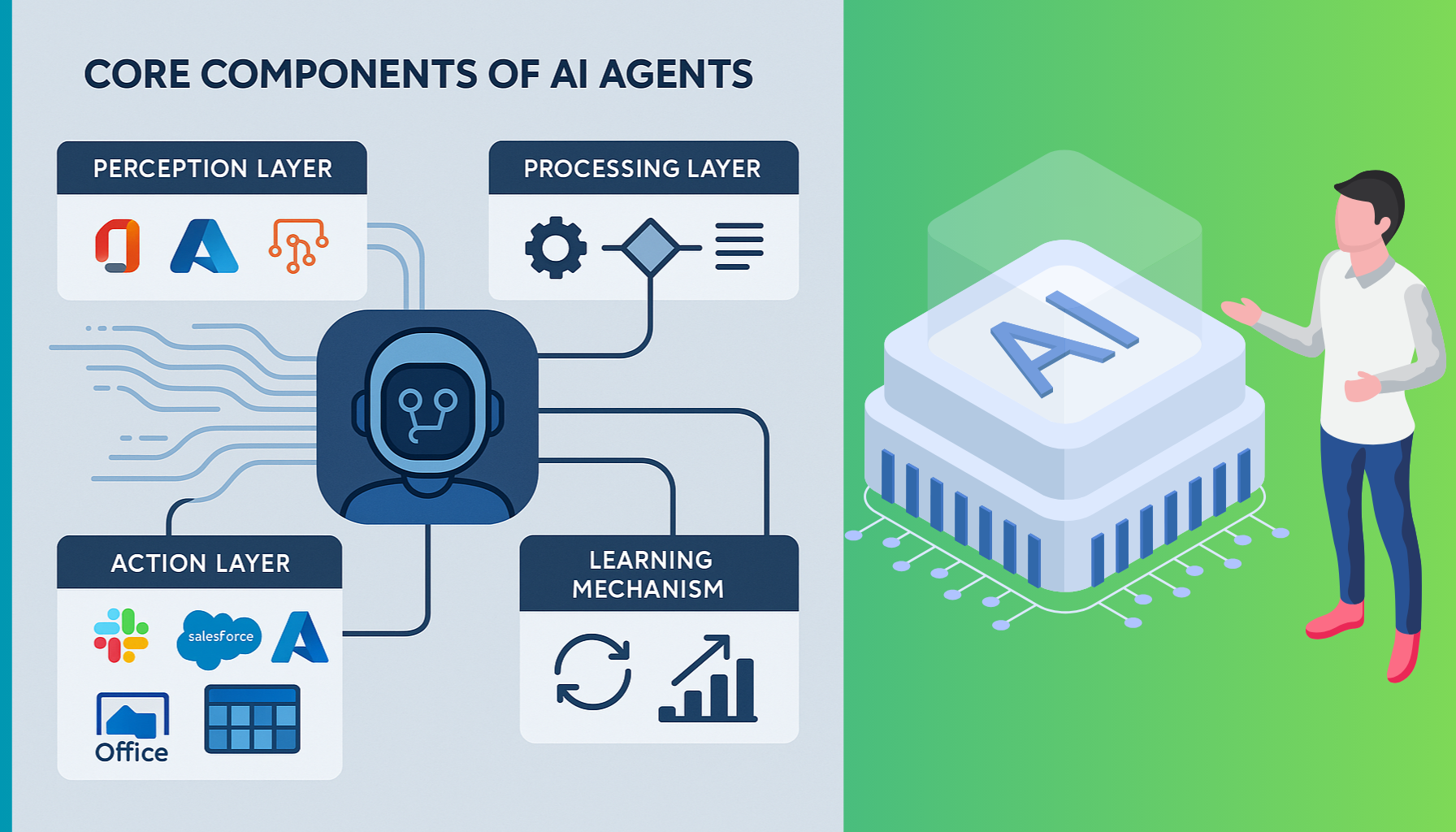
AI Automation Tools Basics for Founders: How Digital Workers Think, Act, and Learn
The term “AI agent” is everywhere, often described as a “digital employee” that can autonomously handle tasks for your startup. But what does that actually mean? How does a piece of software go from a simple chatbot to a reliable team member that can manage your calendar, update your CRM, or handle customer inquiries? For non-technical founders, understanding AI Automation Tools and the underlying technology is crucial for making smart investment and strategy decisions. You don’t need to know how to code it, but you do need to grasp the core concepts. This blog breaks down AI agent architecture, explaining how these digital employees actually work.
At its core, an AI agent is a software entity designed to perform tasks autonomously, mimicking human decision-making and actions. Think of digital employees as virtual team members who tirelessly handle repetitive tasks, analyze data, and even make informed decisions, freeing your human team to focus on strategic initiatives. While a standard AI model can generate text or analyze data, an AI agent can take the next step: it can use tools to interact with other software and complete multi-step tasks in a defined environment.
Think of it this way: if an AI model is a brilliant analyst who can write a report, an AI agent is the project manager who takes that report, emails it to the relevant stakeholders, schedules a follow-up meeting based on their replies, and updates the project status in your management tool.
Understanding how these digital employees operate can significantly enhance your startup’s efficiency, scalability, and competitive edge.
Core Components of AI Agents Explained
Every effective AI agent, regardless of its specific job, is built on a similar blueprint. This architecture can be broken down into four key layers that work in a continuous loop: perceive, process, act, and learn
- Perception Layer (Data Input)
This layer is the “eyes and ears” of your digital employee. It gathers data from various sources—such as customer interactions, databases, or sensors—and prepares it for processing. Effective data collection and pre-processing are crucial for accurate decision-making.
- Processing Layer (Decision Making)
Here, the AI agent analyzes the input data using algorithms and models. This layer is akin to the brain, where decisions are made based on predefined rules or learned patterns. Advanced agents utilize machine learning (ML) and natural language processing (NLP) to interpret complex data and scenarios.
- Action Layer (Task Execution)
Once a decision is made, the action layer executes tasks. This could involve sending emails, updating databases, generating reports, or interacting with customers through chatbots. The efficiency and accuracy of this layer directly impact your operational productivity.
- Learning Mechanism (Improvement Over Time)
AI agents continuously improve their performance through feedback loops. By analyzing outcomes and adjusting their algorithms, digital employees become smarter and more efficient over time, adapting to changing business environments and customer needs.
Types of AI Agents for Different Functions
Not all AI agents are created equal. Understanding the types available helps you select the right digital employee for your startup’s specific needs:
Rule-Based vs. Learning Agents
- Rule-Based Agents: Operate on predefined rules and logic. Ideal for straightforward, repetitive tasks with predictable outcomes.
- Learning Agents: Utilize machine learning to adapt and improve from experience. Suitable for complex tasks requiring adaptability and nuanced decision-making.
Specialized vs. General-Purpose Agents
- Specialized Agents: Designed for specific tasks, such as customer support bots or data analytics assistants.
- General-Purpose Agents: Capable of handling a variety of tasks across different domains, offering broader utility but potentially requiring more initial setup and training.
Integration Architecture: Connecting AI Agents with Your Existing Systems
Integrating AI agents into your existing infrastructure is critical for seamless operations. Here’s what you need to consider:
API Considerations
APIs (Application Programming Interfaces) enable AI agents to communicate effectively with your existing software systems. Ensure your digital employees can easily integrate via robust, well-documented APIs.
Security and Data Privacy
Protecting sensitive data is paramount. Choose AI agents with built-in security protocols, encryption standards, and compliance with data privacy regulations like GDPR or CCPA.
Scalability and Flexibility
Your AI architecture should scale effortlessly as your startup grows. Opt for modular, cloud-based solutions that allow easy expansion and integration with new tools and platforms.
Loves Cloud’s Technical Approach: Simplifying AI Automation Tools for Non-Technical Founders
At Loves Cloud, we specialize in bridging the gap between complex AI technology and practical business applications. Our approach includes:
- User-Friendly Interfaces: Intuitive dashboards and tools designed specifically for non-technical users.
- Customized AI Solutions: Tailored digital employees that align precisely with your startup’s unique needs and workflows.
- Comprehensive Support: Ongoing technical support and training to ensure your team maximizes the benefits of AI technology.
Ready to Empower Your Startup with AI Automation Tools?
Understanding AI agent architecture doesn’t have to be complicated. With the right guidance and tools, non-technical founders can confidently leverage digital employees to drive growth and innovation.
Ready to explore how AI agents can transform your startup?

